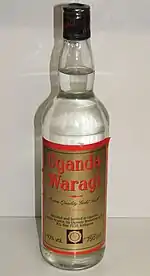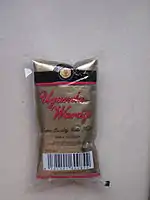Waragi
Waragi (pronounced [ˈwaɾaɡi], also known as kasese) is a generic term in Uganda for domestic distilled beverages. Waragi is also given different names, depending on region of origin, the distillation process, or both. Waragi is known as a form of homemade Gin. The term "Waragi" is synonymous with locally distilled gin in all parts of Uganda. However, Uganda Waragi is a distinct and a particular brand of industrially distilled gin specific to Uganda. Other brands of distilled gin which are done by individuals at small scale are also available, but they are also unique and different from each other. The most common are: 1. "Kasese-Kasese" which was originally distilled in the district of Kasese in western Uganda and sold all over the country; 2. "Lira-Lira" which first originated in Lira district in northern Uganda and sold all over the country as well. These two brands "waragi" have different tastes and scents from each other. The distillation process in both cases produce highly distilled gin at the level produced industrially. A commercial brand called Uganda Waragi is produced and marketed by East African Breweries Limited.


Moonshining and consumption of waragi and other alcoholic beverages is widespread in Uganda. In the 2004 WHO Global Status Report on Alcohol, Uganda ranked as the world's leading consumer of alcohol (per capita).[1] Based on results from 2007, Uganda’s overall alcohol consumption was an average of 17.6 liters per capita. This is unusually high compared to surrounding countries.[2] In 2016 this seems no longer the case, with total consumption of pure alcohol down to 9.5 litres per capita (≥ 15 years of age).[3]
History
The "Uganda Waragi" as is known today - the industrially triple distilled gin was first introduced by first post-independence Ugandan government led by Ugandan People Congress (UPC) party as a form of protest against the Liquor Act (1960) enacted by the colonial government, which hindered the production and consumption of locally produced gins in Uganda. The real intention of the Liquor Act was not to safe guard the health of Ugandans but it was to protect the Alcohol market for the British Gins imported into Uganda. The sales of British gin had fallen steadily as more Ugandans especially the civil servants, business people and ordinary Ugandans had turned to consuming locally brewed liquor which was much cheaper than the imported gin. The local Members of Parliament at the time led by UPC and DP protested the passing of "Liquor Act", arguing that the local producers should be helped to construct a modern distillery factory for modern production of liquor. When the first UPC government came to power, it built a factory and named the liquor "Uganda Waragi" to compete with the imported British Gins. The first Uganda Waragi was produced by a group of 26 blenders who formed the first association of Uganda Distillers and Vitners, led by Master Blender Joel Sentamu.
The Enguli Act of 1965- was meant to encourage local Enguli producers to supply Enguli to the newly established modern distillery for Uganda Waragi production, and local production could only be done with legal licenses as a way to establish a regulated and taxed business. Furthermore, those who had the license were required to sell it to the East African Distillers. When Enguli was received from local suppliers, over the years it was distilled to Uganda Waragi.[4]
Waragi derives its name from "war gin", as the British colonial expatriates in the 1950s and 1960s referred to the distilled spirit known in Luganda language as enguli. The pronunciation with the hard [ɡ] sound is more common; those who are aware of the English origins of the word often favor a "j" sound for [ˈwaɾadʒi]. Its appearance first came about when British soldiers were first starting to create inroads into East Africa. They used brigades of Nubian Soldiers to help with the feat, and they concocted the alcohol to help keep up good spirits. It then spread throughout Uganda as a well-known drink.[5] Another theory is that the name is a corruption of "Arak" the North African spirit with which the Nubian soldiers would have been familiar.
The colonial authorities of Uganda banned the drink and the laws still exist today. Africans at the time would not drink it publicly because drinks that were less harmful to them were also off limits then.[6]
In 1965, "The Enguli Act" decreed that distillation would only be possible under licence, and that distillers should sell their product to the government run Uganda Distilleries Ltd – which produced a branded bottled product, marketed under the name Uganda Waragi (distilled from millet and today wholly produced by East African Breweries Limited). "The Enguli Act" was never successfully enforced, as unlicensed production of waragi persisted.[7]
People in Uganda now drink the harsh gin and authorities overall ignore the law and do not enforce it regularly. It is sold in shops and bars across Uganda and a distilled version is sold overseas. The product that is sold overseas is double and sometimes triple distilled from the alcohol that village distillers make for the factories in Uganda. When it is distilled, flavors are added and many impurities and dangerous parts of the alcohol are filtered out.[6]
Incidents
In April 2010, 80 people died from multiple organ dysfunction syndrome after drinking waragi adulterated with a high amount of methanol over a three-week period in Kabale District.[8][9][10] Many of the deaths were blamed on the reluctance of people to openly admit their relatives had been drinking it, allowing the abuse of the substance to continue.[9][10] When revelations came about houses were searched, with around 120 jerrycans uncovered.[10]
The death toll of 80 was arrived at after 15 people died in the period between April 23 and the weekend before.[11] Deaths in Kamwenge went from five to nine after four people died on 21 April.[11] Two people were hospitalised at Kamwenge's Ntara Health Centre IV and five were hospitalised at Mbarara Regional Referral Hospital.[11]
BBC correspondent Joshua Mmali described it as "the largest number killed at one time for several years."[10]
Process
VICE, a news outlet known for "immersion journalism" devoted an episode of their web series Fringes to the process of making and distributing Waragi. The episode also covered the cultural significance of Waragi in Uganda, with reporter Thomas Morton imbibing various distillations of the traditional beverage.[12] Waragi can be brewed from bananas.[13]
Variants
The base of waragi distillate can be made from either cassava, bananas, millet or sugar cane, depending on the crops grown in the region. The most popular (besides the branded Uganda Waragi) are Lira Lira and Kasese. Lira Lira is made mainly from cassava flour and cane sugar, and is named after the town of Lira. Kasese, named after the town of Kasese, is a potent banana gin. Waragi may also be known as "regular" or "super."
Availability
Close to 80% of the Waragi today is made in Uganda. A large glass of this unregulated liquor goes for approximately 25 cents, making it easily accessible for Ugandans.
See also
- Changaa (in Kenya)
References
- WHO Global Status Report on Alcohol 2004 Archived February 6, 2013, at the Wayback Machine
- "Visualizations:Alcohol Consumption Worldwide". Visualizations:Alcohol Consumption Worldwide.
- "GHO | By category | Alcohol - Data by country". WHO. Retrieved 2019-10-04.
- "Uganda Waragi" (PDF). Uganda Waragi. The spirit that binds us.
- "Uganda on a Plate". Uganda on a Plate.
- "Uganda drinks in Africa". Uganda drinks in Africa.
- A Study on Sentencing and Offences Legislation in Uganda Archived March 3, 2016, at the Wayback Machine, The Justice Law and Order Sector (JLOS)
- "Home-made gin kills 80 in a month in Uganda". Herald Sun. 25 April 2010. Retrieved 25 April 2010.
- "80 people die of methanol-laced gin in Uganda". The Gazette (Montreal). 23 April 2010. Archived from the original on 27 April 2010. Retrieved 23 April 2010.
- "Illegal banana gin 'kills 80' in Uganda". BBC. 23 April 2010. Retrieved 23 April 2010.
- "Waragi Death Toll Rises to 80 in Kabale". TMC. 23 April 2010. Retrieved 23 April 2010.
- Morton, Thomas. "War Gin: Fringes". Video. VICE.com. Retrieved 9 November 2012.
- "Archived copy" (PDF). Archived (PDF) from the original on 2012-04-06. Retrieved 2011-11-09.CS1 maint: archived copy as title (link)